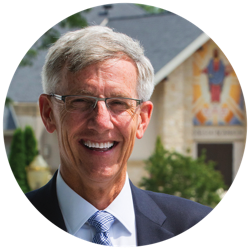As you conduct your search for a Catholic college or university, you will encounter a variety of approaches with the academic programs. They vary for very good reasons: 220+ institutions with differing visions and missions; the charism of a particular sponsoring religious order; or perhaps simply faculty creativity. For example, if the religious order works in the health field you may find a focus on nursing programs. The Jesuits are known for social justice so you will likely find academic programs that emphasize assisting the underprivileged or underserved. Of course, these are examples of student specialization.
But what about the aspect of the academic programs that is “common” to all graduates?
This is an important area to consider when comparatively considering schools because the ‘core’ or ‘general’ education requirements are a reflection of what the institution considers foundational to the higher education experience…so important that they require every graduate to study these subjects as a condition for graduation. Said another way, these are the elements that “set the table” for how the school intends to prepare you for the challenges that life will send your way.
As you review academic catalogs, you will notice different approaches to educating you about faith in the offerings of courses in theology and/or religious studies. Is there a difference and is that important to you?
Maybe…and yes! Here is what you should know as an informed prospective student.
The starting point for understanding academic courses in these two areas is this premise: theology is not the same as religion. Let me offer this mathematically: religion ≠ theology. Religion is what you believe, what you practice, and how you choose to live. Theology, on the other hand, is how you talk about your beliefs, how you think about what your beliefs mean, and how you critically critique your manner of living. Theology examines with argument and evidence theories while religion seeks to consider practical realities. While they are different, they are certainly connected and related…not unlike the relationship between aerodynamics and piloting an airplane.
In your search you may encounter yet a third kind of course offering: spirituality. Simply think of this as course that reflects upon the tools or expressions of religion, such as prayer rituals or methods of providing for the less fortunate. These are ways of practicing or living out religious beliefs. But let’s look deeper at these terms of theology and religious studies as they are the primary domains for undergraduate studies.
Theology. The Catholic Church teaches there are two forms of knowledge: what we know by natural reason and what we know by divine revelation. For centuries, Christian theology has been the methodical and regular study about God’s self-revelation through the person of Jesus Christ. This word, theology, has been handed down to us from a Greek scholar born in the early part of the third century named Origen (d.254). He actually used the Greek phrase “theou logos”…meaning “the reasoning about God.” Studying the development of divinely inspired knowledge about God is what theologians do and have done for a very long time. Dating back to the Middle Ages, theology has been a disciplined academic subject that continues in its development today. Why? Because theology helps all other fields of knowledge find meaning and perspective. For that reason it has for centuries been referred to as the “Queen of the Sciences.” Think about how understanding aerodynamics impacts how to fly an airplane. That is what theology does in a cross-disciplinary manner with all other forms of knowledge. Without going into any more technical detail, it is important to note that the study of theology requires the faculties of faith and reason. These are not contradictory…they were both created for human use by the same God to help mankind come to know Him better. St. Augustine said it best, “understand so that you may believe, believe so that you may understand.”
Why offer courses in theology? To assist in a student’s search for truth with theology is learning who God is—the source of all Truth—and conducting this study from inside of the faith.
Religious studies. The study of religions is also conducted in a disciplined manner but examines differences in various sets of beliefs, practices, and behaviors. This approach focuses on an exchange of information providing a student the ability to describe and associate a particular set of behaviors and understandings to its teacher. The examination may include any of the 33,000+ Christian religions which have broken away in recent centuries from the Catholic Church all claiming to follow the teachings of Jesus. We should remember that up until the 16th century the Catholic Church alone taught and followed the teachings of Jesus Christ. There are also the teachings of others that might be considered in a religious studies course, such as Budda or Mohammad.
A religious studies approach does not presume the student has a particular belief system; thus, only the use of reason is necessary. The contribution to the student’s search for truth with religious studies is often limited to an outsiders perspective of particular faith traditions.
The Catholic Church established the world’s first universities in order to preserve, generate, and transmit knowledge; therefore, the stance of a Catholic college or university that is modeling a 2,000 year-old Catholic intellectual tradition considers both natural and revealed sources in the search for Truth—both emanating from the same Transcendent One. The school may offer both theology and religious studies, but should never rely solely on religious studies for a student’s education. Higher levels of knowledge, a key purpose of higher education, are acquired when we study all forms of knowledge to deepen our understanding of the meaning and our purpose of life as well as how the physical world works.
Look closely at the academic programs offered. Religious studies are fine, but look for how the school intends to bring you into contact with the field of theology. You might need both (theology and religious studies) to make sense of our ever-more complex world depending upon how the institution structures its programs. Regardless, a Catholic college or university should ensure you are offered the opportunity to study God within the field theology.
Is there a difference? I think so…and now you know!
Reference for further understanding
Egan, P. A. (2009). Philosophy and Catholic theology: A primer. Collegeville, MN: Liturgical Press.

